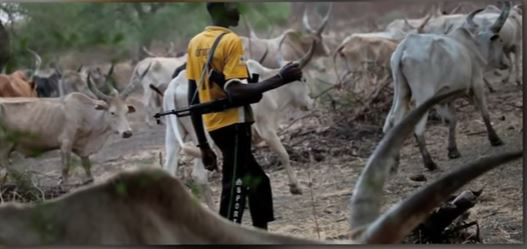
NORTH-CENTRAL NIGERIA (BP) — The increasingly militant killings of Christians in north-central Nigeria by Muslim Fulani herdsmen are described as revived attempts at religious and ethnic cleansing by survivors, Morning Star News reported.
 Fulani herdsmen, at times disguised as Nigerian soldiers expected to protect villagers, killed at least 36 Christian farmers in separate attacks in four villages in Kaduna state in mid-November, Morning Star said. The killings are on the heels of the slaughter of about 85 Christians in Kaduna between September and Nov. 13 by the herdsmen, and are part of at least 140 such deaths since attacks intensified in May, Morning Star reported.
Fulani herdsmen, at times disguised as Nigerian soldiers expected to protect villagers, killed at least 36 Christian farmers in separate attacks in four villages in Kaduna state in mid-November, Morning Star said. The killings are on the heels of the slaughter of about 85 Christians in Kaduna between September and Nov. 13 by the herdsmen, and are part of at least 140 such deaths since attacks intensified in May, Morning Star reported.
A local pastor of the Evangelical Church Winning All (ECWA), Zachariah Gado, has called the killings “a campaign of ethno-religious cleansing by Fulani herdsmen militia.” The attacks target Christians and members of the Kaninkon Chiefdom ethnicity, a ruler from the ethnic group told CityNewsline.com and other local news sites.
Concurrently about 475 miles east of Kaduna, Boko Haram militants continue to destroy villages around the mostly Christian town of Chibok, the site of the 2014 kidnapping of nearly 300 schoolgirls, World News Service reported. The attacks have occurred even as Nigerian military officers continue to proclaim defeat of the Islamists, a claim Nigerian President Muhammadu Buhari first said in late 2015.
The president of the Christian Association of Nigeria (CAN), Samson Supo Ayokunle, called the Fulani attacks “Boko Haram in another color.” Fulani herdsmen have also wounded 215 and displaced 10,000 Christians since May, CAN leaders said.
The Jubilee Campaign for religious freedom issued a statement Nov. 9 noting the herdsmen have become increasingly murderous and bold.
“The Fulani militants have gotten little international attention due to a focus on the Boko Haram, allowing their activities to grow unchecked,” Jubilee said. “They typically kill villagers, burn villages, and move in with their cattle so that any survivors from the attacked villages are unable to return and rebuild their lives. Christian communities have been especially attacked and displaced.”
In the latest attacks, heavily armed Fulani herdsmen began killing Christians Nov. 23 in Pasakori village and continued attacks days later in the nearby villages in the Gidan Waya District of Kaduna, area resident and ECWA member Joshua Aku told Morning Star. Herdsmen first burned the home of district leader and ECWA member Daniel Akai, Aku said.
“The house of Mr. Akai was burned by the herdsmen, as was St. Paul’s Catholic Church, and the offices of the ECWA Gidan Waya District Church Council were also destroyed,” Morning Star quoted Aku. “Most residents of Gidan Waya believe the herdsmen were brought to the area in a military helicopter and were ferried away soon after perpetuating the atrocities on the Christian communities.”
Nigerian military leaders, proclaiming a technical defeat of Boko Haram for nearly a year, have told residents that plans are in place to defeat the herdsmen. But such proclamations have not comforted Christian villagers who believe Boko Haram is still strong, based on attacks around Chibok, World News Service (WNS) reported. As recently as Nov. 20, Nigerian Army Chief Tukur Buratai said his troops had defeated Boko Haram and were involved in “mop-up operations” until remaining Boko Haram members surrender, WNS said.
Boko Haram attacked at least nine villages within 16 miles of Chibok in early November, Chibok local government chairman Yaga Yarkawa said at a Nov. 22 press conference, WNS said.
“Chibok is now under Boko Haram siege,” Yarkawa said. “Contrary to claims by the government and security operatives, Chibok is not safe.” Others, including Human Rights Watch Nigeria leader Mausi Segun, have also accused the Nigerian government of downplaying Boko Haram’s strength.
Boko Haram has killed an estimated 25,000 people and displaced about 2.5 million, including many Christians, in northeastern Nigeria since 2009 in its attempts to establish strict Sharia law across the country. The insurgents, who have proclaimed allegiance to the Islamic State, are also blamed for creating a humanitarian crisis of homelessness, hunger, sickness and starvation.














